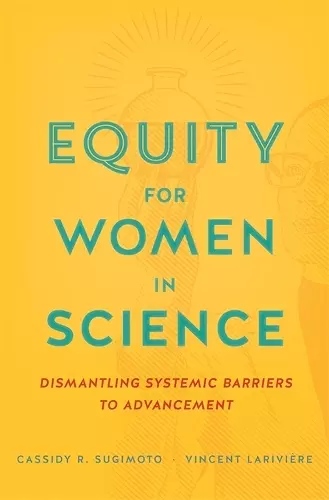Equity for Women in Science
Dismantling Systemic Barriers to Advancement
Cassidy R Sugimoto author Vincent Larivière author
Format:Hardback
Publisher:Harvard University Press
Published:28th Apr '23
Should be back in stock very soon

The first large-scale empirical analysis of the gender gap in science, showing how the structure of scientific labor and rewards—publications, citations, funding—systematically obstructs women’s career advancement.
If current trends continue, women and men will be equally represented in the field of biology in 2069. In physics, math, and engineering, women should not expect to reach parity for more than a century. The gender gap in science and technology is narrowing, but at a decidedly unimpressive pace. And even if parity is achievable, what about equity?
Equity for Women in Science, the first large-scale empirical analysis of the global gender gap in science, provides strong evidence that the structures of scientific production and reward impede women’s career advancement. To make their case, Cassidy R. Sugimoto and Vincent Larivière have conducted scientometric analyses using millions of published papers across disciplines. The data show that women are systematically denied the chief currencies of scientific credit: publications and citations. The rising tide of collaboration only exacerbates disparities, with women unlikely to land coveted leadership positions or gain access to global networks. The findings are unequivocal: when published, men are positioned as key contributors and women are relegated to low-visibility technical roles. The intersecting disparities in labor, reward, and resources contribute to cumulative disadvantages for the advancement of women in science.
Alongside their eye-opening analyses, Sugimoto and Larivière offer solutions. The data themselves point the way, showing where existing institutions fall short. A fair and equitable research ecosystem is possible, but the scientific community must first disrupt its own pervasive patterns of gatekeeping.
The empirical analysis of disparities in funding, impact indicators, and institutional mobility provide rigorous evidence for the obstacles that continue to hamper women scientists. The result is a scathing indictment of scientific institutions’ failure to promote gender equity. * Publishers Weekly *
Equity for Women in Science succeeds in providing fresh insights into where women scientists' work is systematically devalued and underrecognized. -- Mary Blair-Loy * Science *
Are gender inequities slowly disappearing in the natural and social sciences?…Equity for Women in Science is a convincing reply to those who advance such arguments. Less overt—all but invisible—gender gaps are still with us…Besides copious amounts of data, the book provides revealing vignettes of the experiences of women in science, along with telling examples of institutional practices, both past and present. -- Virginia Valian * Nature *
With such extensive documentation of the gendered nature of scientific production, labour, and reward, Equity for Women in Science is important. It should be seen as a definitive account of trends to 2020, and can inform institutional priorities and action. It will be an instructive baseline to gauge the pandemic’s impact on women’s work in research and publishing and how it was valued and credited. -- Jocalyn Clark * The Lancet *
Details the many ways that scientists, policy-makers, funders of research and science communicators can help to close [the gender] gap. * New Scientist *
This is the book I’ve always wanted. Full of statistics, anecdotes, and evidence-based suggestions that will transform the way the world understands the underrepresentation of women in science. -- Jess Wade, physicist and author of Nano: The Spectacular Science of the Very (Very) Small
In this illuminating portrait of the place of women in science today, Sugimoto and Larivière combine rigorous quantitative analysis with vivid human stories to describe the hurdles still to be overcome if women are to achieve both parity and equity. A lively and informative read with a compelling agenda for change. -- Drew Gilpin Faust, President Emerita of Harvard University
Taking a precise and elegant scientometric approach, Sugimoto and Larivière reveal the mechanisms gendering science production, labor, and reward. They bring to light the parity paradox, where equal numbers often do not result in equal credit, and show that the people most acclaimed for doing science ultimately determine how science is done. -- Londa Schiebinger, coeditor of Gendered Innovations 2
Science is one of humankind’s greatest achievements but it has a dispiriting legacy of male dominance. This rigorous and insightful book digs into the numbers to offer a comprehensive, up-to-date assessment of the manifold inequities that diminish the participation and recognition of women in science. With the data as their guide, Sugimoto and Larivière name the problem that has dogged science for far too long and map out a solution. -- Stephen Curry, Professor of Structural Biology, Imperial College London
ISBN: 9780674919297
Dimensions: 235mm x 156mm x 25mm
Weight: 590g
272 pages